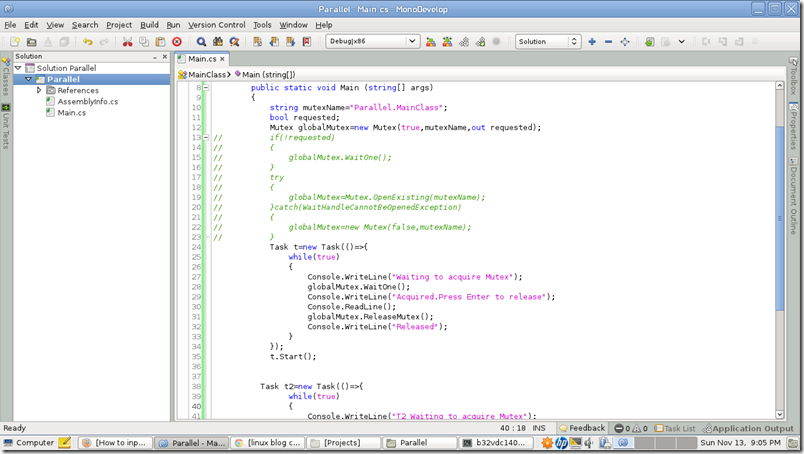上文介绍的互斥方法都是用于进程间的不同线程的互斥。.NET 提供了不同进程间线程互斥的方法。可以使用named mutex来实现进程间的互斥。named mutex是一个全局的mutex,通过给mutex一个名称,可以在所有进程间有效。注意要仔细选择mutex的名称,避免和其他程序冲突。
using System; using System.Threading; using System.Threading.Tasks; namespace TaskParallel { class MainClass { public static void Main(string[] args) { string mutexName = "Parallel.MainClass"; Mutex globalMutex; try { globalMutex = Mutex.OpenExisting(mutexName); } catch (WaitHandleCannotBeOpenedException) { globalMutex = new Mutex(false, mutexName); } Task t = new Task(() => { while (true) { Console.WriteLine("Waiting to acquire Mutex"); globalMutex.WaitOne(); Console.WriteLine("Acquired.Press Enter to release"); Console.ReadLine(); globalMutex.ReleaseMutex(); Console.WriteLine("Released"); } }); t.Start(); t.Wait(); } } }
首先使用Mutex.OpenExist方法来判断是否已经存在该命名mutex,如果不存在,则会抛出一个异常,再使用Mutex(bool,string)构造函数创建新的mutex,第一个参数如果为true,那么这个mutex初始情况下就已经被锁,需要调用mutex.Release()之后才能使用。Mutex还有一个构造函数,可以避免抛出异常,
bool created; Mutex globalMutex = new Mutex(false, mutexName, out created);
created如果是false,则说明当前命名mutex已经存在。编译之后打开两次这个程序,可以看到两个进程依次获得mutex锁:
提个外话,我在linux下配置成功了Mono 2.10.2 和 MonoDevelop 2.8,用的发行版是OpenSUSE,之前尝试过过Ubuntu和Debian,由于没有MonoDevelop的最新的package,不支持.NET4,自己编译安装遇到一系列的问题,linux下装软件除非有现成的安装包,否则几乎必然是一场灾难。OpenSUSE非常的好用,和Mono同宗同源,支持的很好。MonoDevelop自然不能和VS2010比,不过也足够用了。
我用Mono编译运行这个named mutex程序,编译没有问题,但是运行起来完全不是期望的结果。进程间没有互斥。
不知道是不是Mono的bug,在网上查了下,也没有查到。进程间互斥本来就用的不多,再加上是Mono,用的人更少了。标记一下。
言归正传,下面介绍 concurrent collections。通常都通过集合类型来共享(传递)数据,如果要在多个线程中同时访问集合对象,也要考虑互斥的问题,否则会发生错误,例如:
using System; using System.Collections.Generic; using System.Threading; using System.Threading.Tasks; namespace Parallel { public class ConcurrentCollection { public static void Main(string[] args) { Queue<int> sharedQueue = new Queue<int>(); for (int i = 0; i < 10000; i++) sharedQueue.Enqueue(i); int itemCount = 0; Task[] tasks = new Task[10]; for (int i = 0; i < 10; i++) { tasks[i] = new Task(() => { while (sharedQueue.Count > 0) { int item = sharedQueue.Dequeue(); Interlocked.Increment(ref itemCount); } }); tasks[i].Start(); } Task.WaitAll(tasks); Console.WriteLine("{0} items processed", itemCount); } } }
输出的结果往往会大于1000,而且有时会因异常退出。这是因为Dequeue方法不是原子操作,可能会执行到一半被打断,使得Queue 内部的状态被打乱.
PS.在Mono下此程序执行的结果完全确定,每次都和预设的itemCount一致。看来Mono的行为和MS的.NET还是有差别。
.NET 4提供了一组可以并发访问的集合类型,以System.Collections.Concurrent.ConcurrentQueue 为例,它的Enqueue和TryDequeue方法都是线程安全的,TryDequeue方法如果成功取得了对象,就返回true,否则返回false,因此上面的代码可以改成:
while (sharedQueue.Count > 0) { int item; while (!sharedQueue.TryDequeue(out item)) ; Interlocked.Increment(ref itemCount); }
这样就可以安全访问了.
PS. 很不理解.net 为什么把Enqueue和Dequeue设计成如此不对称的方式。查看了下Mono的源代码,它的TryDequeue似乎永远也不会返回false,也就是说本质上是和Enqueue对称的。我试验了下,确实不会返回false。而微软的实现就不一样,会大量的返回false,必需用一个while套起来不断循环,比较奇怪。下次要继续研究下这样设计的原因。


